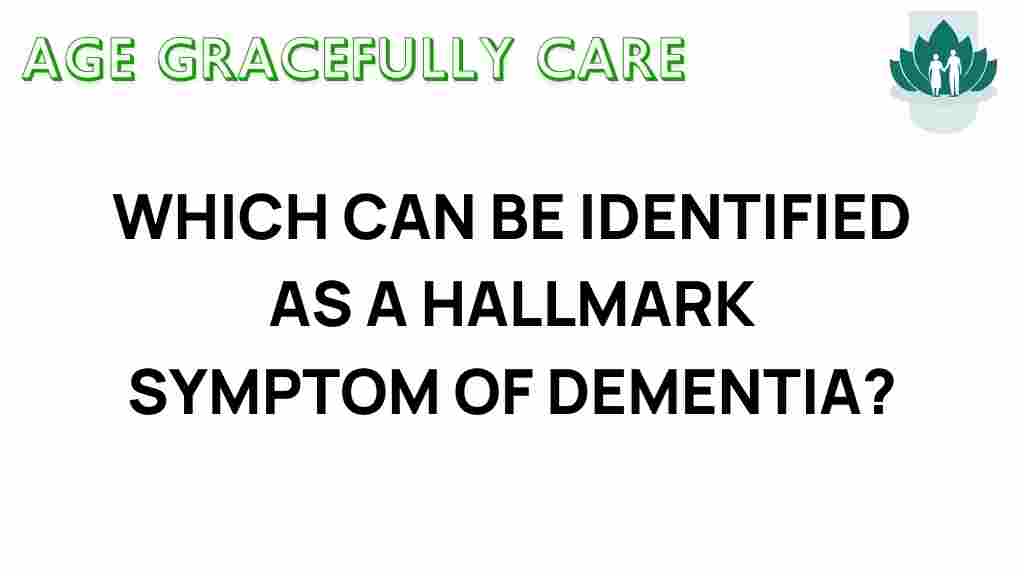Unraveling the Silent Clue: What Defines Dementia’s Hallmark Symptom?
Dementia is a term that encompasses a variety of neurological disorders characterized by a progressive decline in cognitive functions, significantly impacting daily living. Among the many symptoms associated with dementia, memory loss stands out as the hallmark symptom that often signals the onset of this debilitating condition. Understanding this early sign is crucial for patient care, mental health, and overall quality of life.
Understanding Dementia and Its Hallmark Symptom
Dementia is not a single disease but rather a general term that describes a range of symptoms affecting memory, thinking, and social abilities. Common forms of dementia include Alzheimer’s disease, vascular dementia, and Lewy body dementia. The hallmark symptom of dementia, memory loss, often serves as the first noticeable indicator that something may be amiss.
The Role of Memory Loss in Dementia
Memory loss in dementia can manifest in various ways, and understanding these manifestations can help in the early identification of the disease. Here are a few key aspects:
- Short-term memory loss: Individuals may forget recent conversations or events, struggling to recall information they just learned.
- Difficulty with familiar tasks: Routine activities, such as cooking or managing finances, can become challenging.
- Disorientation: Patients may confuse time, place, and even the identities of people around them.
- Repetitive questioning: Individuals may frequently ask the same questions, having forgotten they already received answers.
Recognizing Early Signs of Cognitive Decline
Identifying early signs of cognitive decline is crucial for timely intervention and patient care. Here are some additional symptoms that often accompany memory loss:
- Language difficulties: Struggling to find the right words or following conversations.
- Judgment issues: Poor decision-making, especially in financial matters or personal safety.
- Personality changes: Alterations in mood or behavior, which can lead to withdrawal from social activities.
Step-by-Step Process to Identify Memory Loss
Recognizing memory loss as a hallmark symptom of dementia involves a systematic approach:
- Observation: Notice any changes in the individual’s memory and cognitive abilities.
- Documentation: Keep a record of specific instances of memory loss or confusion.
- Communication: Discuss your observations with the individual and encourage them to share their experiences.
- Professional Evaluation: Seek a comprehensive assessment from a healthcare professional specializing in cognitive disorders.
Importance of Early Detection and Patient Care
Early detection of dementia is vital for several reasons:
- Intervention Opportunities: Early detection allows for potential treatment options that may slow the progression of memory loss.
- Planning for the Future: Understanding the diagnosis enables individuals and families to make informed decisions regarding care and financial planning.
- Support Resources: Families can access support groups and resources that provide guidance for managing dementia.
Providing Effective Patient Care
Once dementia is diagnosed, providing effective patient care becomes the top priority. Here are some tips:
- Create a Routine: Establishing a daily routine can help reduce confusion and anxiety in patients.
- Encourage Engagement: Activities that stimulate the mind, such as puzzles or reading, can be beneficial.
- Foster Communication: Use clear, simple language and maintain eye contact to ensure understanding.
Troubleshooting Tips for Managing Memory Loss
When caring for someone experiencing memory loss, consider the following troubleshooting tips:
- Label Items: Use labels around the home to help patients remember where things are.
- Use Memory Aids: Encourage the use of calendars, reminders, and to-do lists.
- Stay Patient: Understand that frustration may arise; patience is key in providing support.
The Connection Between Dementia, Mental Health, and Neurological Disorders
Dementia often coexists with other mental health issues, such as depression and anxiety. This connection can complicate the diagnosis and treatment of dementia. Here’s how:
- Depression: Individuals with dementia may experience depression, which can exacerbate memory loss and cognitive decline.
- Anxiety: The fear of losing memory and independence can lead to increased anxiety levels.
- Behavioral Changes: Neurological disorders may lead to behavioral changes, further complicating the patient’s condition.
Resources for Support and Education
For those impacted by dementia, there are numerous resources available for education and support. Consider exploring:
- Alzheimer’s Association – A comprehensive resource for information, support, and research on dementia.
- National Institute on Aging – Offers information on aging-related issues, including dementia.
Conclusion
Memory loss is a hallmark symptom of dementia, playing a pivotal role in the diagnosis and understanding of this complex neurological disorder. Recognizing early signs of cognitive decline is essential for effective patient care and mental health management. By raising awareness and providing the necessary support, we can improve the quality of life for those affected by dementia.
As we continue to unravel the silent clues of dementia, it is vital to foster understanding and compassion for individuals and families navigating this challenging journey. With proper care, resources, and early intervention, we can make a significant impact on the lives of those living with dementia.
This article is in the category Health and created by AgeGracefullyCare Team
